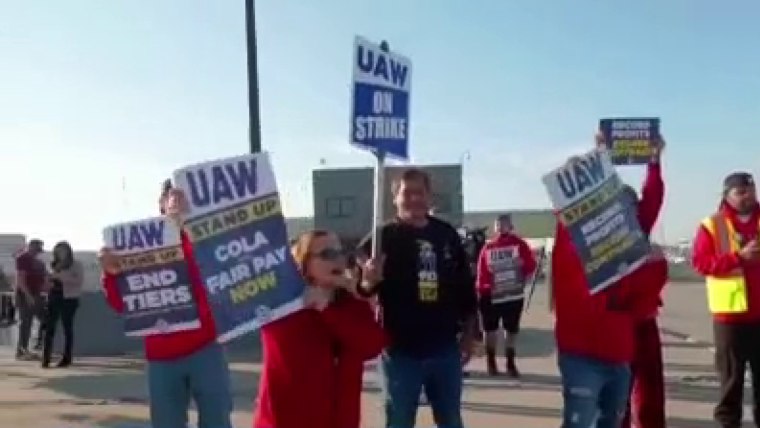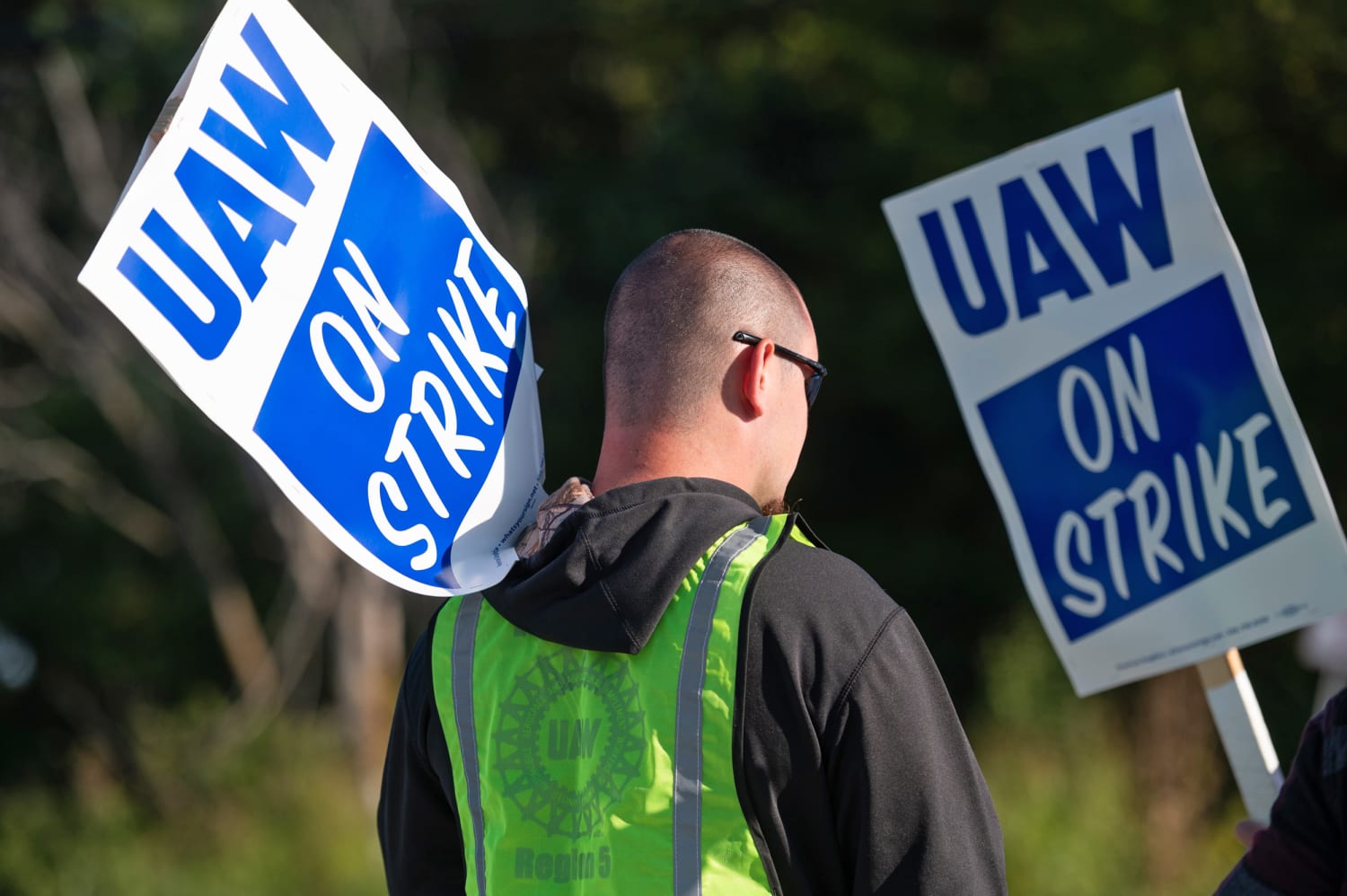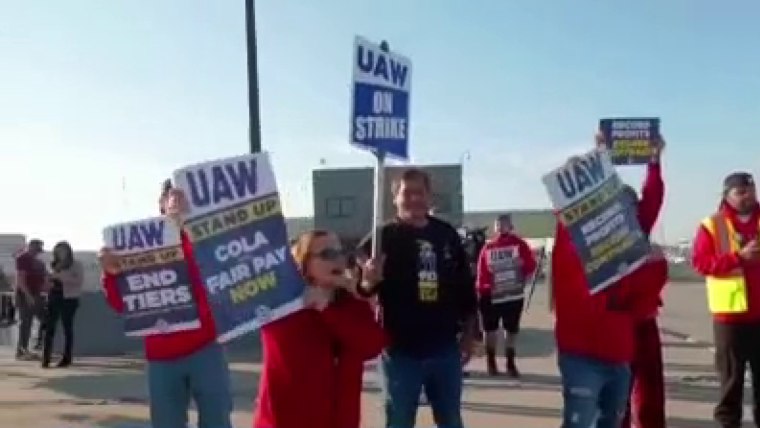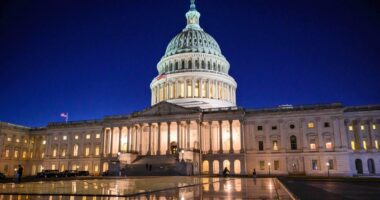Striking autoworkers want to be paid more. They also want to be paid more equally.
One of the top goals of the United Auto Workers, which began striking at three plants early Friday, is to eliminate “tiered” compensation at the Big Three U.S. carmakers — General Motors, Ford and Chrysler-maker Stellantis. The union says the arrangements leave many employees with steeper climbs up the wage-and-benefits ladder than some of their colleagues.
The demand to end the practice mirrors one that UPS workers won at the nation’s biggest package carrier this summer, fueling expectations that the UAW effort could generate pushback against staggered pay elsewhere.
“The UPS deal brings more public attention to the issue of the elimination of two-tiered pay and benefit structures,” said Seth Harris, a law and policy professor at Northeastern University who was President Joe Biden’s top labor policy adviser until last year. That labor victory, he said, “puts pressure on the UAW negotiating team to do the same.”
Under the UAW’s 2019 contracts, which expired Friday, a new hire can eventually work up to the pay level of a veteran employee, but reaching parity takes eight years. (The automakers’ latest proposals would shorten that period to four years.)
And on a given Big Three assembly line, a temp worker making $18 an hour could be performing the same tasks alongside an entry-level hire earning $22 an hour or a longtime employee paid $32 an hour — all largely depending on which labor contract was in force when each one was hired.
At UPS, critics of the discontinued pay system said it created second-class positions in which some workers with a wider range of responsibilities earned less than those with narrower roles. UAW President Shawn Fain — who ran for the top job on a “no corruption, no concessions, no tiers” slogan — has similarly said that the auto industry’s version of the practice creates a “growing underclass” of workers.
Union leaders have also highlighted the Big Three’s ongoing use of “subsystem” employees, a group that increasingly includes those hired under joint ventures in electric vehicle manufacturing, which often exempt them from union protections — effectively generating even more pay and benefit classifications.
How labor and automotive leaders define “tiers” is a matter of dispute, especially since the terms dictating employees’ pay and benefits have changed from one contract to the next. Automakers note that they’ve already removed some unpopular policies that limited newer hires’ maximum wages relative to those of workers hired earlier.
But the companies also argue that they need flexibility to keep labor costs down and stay competitive during the EV transition, particularly with nonunion rivals that pay many of their employees less. Tesla, for example, is the only U.S. auto company that doesn’t use any unionized workers. Foreign automakers, such as Volkwagen and Toyota, employ organized labor overseas but not in the U.S.
David Whiston, a Morningstar analyst who covers the Big Three, said the automakers may also be looking to maintain a tool for developing and retaining talent.
“A lot of business owners would say if you start someone off at the top wage, that doesn’t give them a lot of incentive to get better,” Whiston said. “So it’s more like: Let the employee show that they’re committed by staying a certain amount of time.”
Other industry experts see the dispute mainly as a fight over how long it should take to rise through the ranks.
The union is aiming “to collapse the lower-paid classifications and accelerate the progression of people from being an entry-level [to] being a mid-level and senior worker,” said Patrick Anderson, principal and CEO of the Anderson Economic Group, which has worked for GM and Ford.
But he added, “The concept of having different occupations and classifications of different workers, that’s been around for centuries.”
Some experts credit the U.S. airline industry with popularizing tiered labor structures, which carriers embraced in the early 1980s but jettisoned after the policies dented morale and as cheaper, smaller rivals folded, reducing pressure to skimp on wages.
After the Great Recession, tiered pay and benefits regained steam as unemployment climbed and workers’ bargaining power eroded. UAW workers hired after 2007, for example, are granted 401(k)s instead of defined pensions.
In 2021, workers at health care giant Kaiser Permanente and the cereal maker Kellogg authorized strikes, both partly in protest of tiered wages. Kaiser workers ultimately defeated the company’s proposed tiered structure without a work stoppage, while Kellogg’s remained, despite a strike that lasted nearly three months.
“In the short term, management at companies think, ‘Well, it’s a good way to cut costs,’” said Kate Bronfenbrenner, director of labor education research at Cornell University’s School of Industrial and Labor Relations. And many employers have found union leaders receptive to the idea because current members’ compensation isn’t affected by offering newer hires different terms.
“But unions figured out pretty quickly that it destroys the union,” she said, and have recently begun using the issue as a rallying point to call for greater solidarity. One factor in this summer’s campaign at UPS was that full-time drivers — who are some of the best paid in the industry — worried the split structure eroded the integrity of their work.
“The top tier also feels threatened because they feel the employer has an incentive to get rid of them and replace them with workers on the lower tier,” Bronfenbrenner said.
She added that she “absolutely” expects pushback to grow against similar pay-and-benefits systems in other industries.
Whiston at Morningstar agreed. With UAW, he said, “it’s such a high-profile labor contract, I’m sure other labor organizations are looking at it.”
Source: | This article originally belongs to Nbcnews.com











